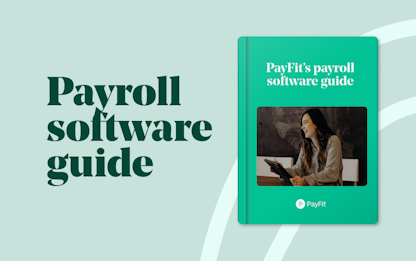- Blog
- |People management
- >Equality, diversity and inclusion
- >Young managers
The increasing trend of young managers


Up until relatively recently, having a manager under the age of 30 was almost unheard of. However, a new management trend is emerging where people who would have previously been considered too junior or young for leaderships positions are being entrusted to manage large teams with more experienced colleagues under their wing.
In this blog post, we will analyse what it's like to be managing a large team in your mid-twenties as well as why some people find it difficult to accept that their manager is younger than them. We will also take a look at what it's like to not have confidence in your ability to be a manager and how you can overcome this self-doubt.
What is the ideal age to become a manager?
Julie Zhuo, the current VP of Facebook Design, was appointed to a managerial position at the age of just 25. She had been at Facebook for only three years and had never previously managed a team.
When she started, she quickly discovered that her responsibilities as a manager were very different from those that she had had previously. Believing that her role now was not to design but to manage, she didn't feel the need to become a better designer than those that she was in charge of. The only thing that she needed to do was to help them to do their best work and perform well as a team.
“Hey, I know I’m new to this job, but my goal is to help you. My goal is to understand what your goals are, what are your career aspirations, what do you like to do, what do you consider your strengths, and to help you reach those goals and to help you apply those strengths to the problems that the team needs to solve.”
Julie Zhuo, VP of Design @ Facebook
Managing when young
With the emergence of modern startups and the evolution of leadership models, those without extensive work experience are suddenly finding themselves thrust into positions of responsibility.
Previously, someone's natural career trajectory was bottom to top. The hierarchical ladder was fairly inflexible and jumping rungs was not all too common. Today, the approach is different.
There is an increased realisation that not everyone is designed to become a manager. There is no shame in this and trying to enforce responsibility on those who aren't cut out for it has proven to be unsuccessful in the past.
In the tech industry, in particular, it's not uncommon to have a manager younger than most of their team members. Tech is volatile, and it is continually evolving. Staying up to date with the latest trends can mean changing processes and systems. To be successful in these sort of companies, someone has to be agile, which inevitably leads to younger people with a willingness to implement new ideas.
Did you know?
In the United States, 69% of workers over the age of 55 have a manager that is younger than them.
A manager at 25
Cedric became a manager at just 25 years old. Initially employed by PayFit UK to help build the product for the UK market, Cedric found himself in a managerial position a mere six months after joining.
"I never set out to be a manager and I certainly didn’t expect to be one so early on in my career. Becoming a manager wasn’t something I chased; instead, the opportunity presented itself organically.”
Cedric Colle, CTO @ PayFit UK
Initially, Cedric only managed one other person and says that the initial transition was not as difficult as he may have suspected. Although his responsibilities changed a little, he still had time to focus on product building.
However, things started to become more complicated as his team expanded, and Cedric began to see his product building time reduce as he was required to focus more of his energy on his team members.
“The transition between not managing anyone to managing one person is not too difficult. In many ways, it’s more akin to collaborating with someone than actually managing them. However, it begins to become more difficult the moment that your team begins to expand. When you’re young and still relatively inexperienced in a managerial role, you can sometimes find it difficult to allocate the right proportion of your time to different tasks. I quickly realised that I would have to delegate tasks to members of my team.”
Cedric
Many newly-appointed managers are likely to say a similar thing. An increased workload means that they have to evaluate the way they split their time. It's at this point that delegation becomes a vital weapon in a manager's armoury.
Understanding when to delegate responsibilities can be problematic at first; however, it's crucial to understand it early on.
Is task delegation the most crucial element in achieving success as a manager?
It’s difficult to say. The delegation of tasks can be difficult for someone who has previously been autonomous. Trusting your team to perform their duties to a high enough standard is something that lots of new managers struggle to accept at the beginning.
Trying to do too much individually will almost certainly lead to burnout and is hardly likely to raise confidence or morale within a team. Equally, overseeing and micromanaging people and projects could easily lead to a breakdown in relations and become exhaustive for all parties.
For Cedric, the key to achieving managerial success is being consistent and having a forward-thinking approach.
“I don't think you ever really know what management is until you're doing it. In all honesty, you never really master it either. For me, it's crucial to have an open mindset and a willingness to adapt to different circumstances. I have different team members with varying personalities; however, I understand that I need to be consistent and non-preferential in my approach.”
Cedric
Respect works both ways
While we have looked at the value of taking on younger managers, it's also important not to ignore the influence that more senior managers can have on a workforce.
Senior managers and employees should be encouraged to support and advise their junior colleagues. Inter-generational working relationships can help create camaraderie in a workforce and nurture more progressive attitudes moving forward.
It is crucial not to dismiss the importance of more experienced employees. Their know-how and maturity can help other employees to forge new skills and become better at their jobs. Therefore, overlooking experienced candidates and dismissing them or their methods as outdated or methods as obsolete is limiting exposure to an extremely knowledgeable portion of the labour market.
Despite this, job advertisements are increasingly asking “young and dynamic” or “young and energetic” personnel, implying that more experienced and older applicants may not have these traits.
Let’s leave age at the door for a moment. Someone’s age is, as the saying goes, just a number. Many people have absolutely no aspirations to become a manager. Instead, they’d rather work individually or as part of a team.
Understanding and respecting that not everyone is the same is crucial. There is an enormous amount of pressure on people to conform to what society considers to be "normal". However, it's good to remember is that not everyone's the same, and we should recognise that people are more than entitled to decide what they want to achieve in their own career.
So, is there an optimal age, neither too young nor too old, to become a manager?
Well, not really.
The world we live in is becoming increasingly more accepting and inclusive and many of us would never dream of judging someone by their sex, sexual or religious orientation. So why should age be any different?
Conclusion
Stay humble. You shouldn't feel the need to apologise for being in a management position. If you're there, it's most likely because you deserve to be. Appeasing someone by saying "I know you have more experience than I do, but…" is unlikely to win you many battles.
Be confident. You shouldn't doubt your own ability. The feedback and advice that you have to give are likely to be really valuable to the people you manage. As a manager, this is one of the most important parts of your job.
Recognise that you need to learn. Nobody takes a management position while wholly qualified to do so. Part of the process is learning and developing while in the role. The very best managers accept that they are never the finished article. Moving forward and adapting to the times will enable you to develop your own personal skills and those of the people you manage.
Trust people and they will be true to you. It's a cliché, but it's almost certainly right. Those who work for you are much more likely to perform well if you leave them to get on with the roles they're employed to do. Micromanaging someone is never likely to win you much support from them. You should be there to give advice and support, and not control or rule.
Be empathetic with your team. If you think that someone is upset or questioning your suitability for the role, try and understand their reasoning behind it. There's little point in rushing in there and trying to change their mind instantly. Instead, take a step back, sit down and have a mature conversation. This is far more likely to gain support.
The PayFit approach
PayFit is a payroll and HR software company that was founded by Firmin, Florian and Ghislain when they were all in their early twenties. The vast majority of the first employees were all around a similar age.
In the five years since its inception, the number of PayFiters has grown to over 500. Many of those initial employees are now managing large teams with people older and more experienced than themselves underneath them.
At PayFit, we don’t look at age or experience when identifying whether someone is suited to a managerial role. For us, the most important traits we look for are those that are aligned with our values; care, humility, excellence and passion.
With the average age for a manager at PayFit being just 30, we understand that many of them are at the beginning of their managerial careers.
As a result, we look to support new managers with training and development programmes that will enable them to achieve both their professional goals, as well as those of the teams they lead.


Types Of Flexible Working - A Guide For Employers

What is Flexible Working Within the UK Workplace?

Understanding the Paternity Leave Changes in 2024

International Day of Transgender Visibility Guide

A Guide to 360 Degree Feedback for UK HR Teams

